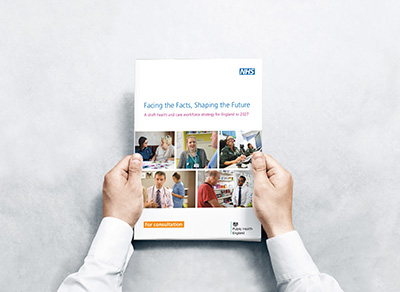Don’t ignore support staff in workforce plans, says MiP

MiP has welcomed the draft NHS workforce strategy, published by Health Education England (HEE) in December, but called for more investment and attention for the “wider NHS workforce” – including managers and support staff – and warned that staff shortages cannot be tackled without more investment in the NHS.
The draft workforce strategy for England, Facing The Facts, Shaping The Future, is the first attempt to devise a coherent plan for the NHS workforce for 25 years. It sets out six “principles” to support better workforce planning: boosting the supply of skilled staff, investment in training and education, improving career pathways, widening participation, modernising employment practices and “joining up” service, financial and workforce planning.
Safe support staffing
In its submission to HEE’s consultation, MiP called for the adoption of indicators for required levels of support staff, similar to those already in place for clinical staff.
“Just as there are staffing level indicators for clinical staff in relation to patient activity, there could also be ones which map out the required level of staff working in the wider workforce in relation to clinical staff and patient activity,” said MiP’s submission. “The development of such ratios could in itself demonstrate the value placed on this group of staff and guide employers on what is the bottom-line.”
The union criticises the continuing under-investment in training for support staff, who make up 40% of the NHS workforce but receive only 5% of the training budget. The submission stated: “Investment is key for this group, which includes many with the lowest level of pay and status, in order for them to be both effective in their ‘day jobs’ and have worthwhile and progressive careers.
“The strategy needs to give a loud and clear message that making the time to train and learn is as important as “doing the day job” in order to secure the long-term future of the workforce,” MiP added.
MiP says the workforce strategy must ensure that all NHS staff feel valued. “There are some staff groups which feel that they are valued less than others,” said the submission, adding that managers are “a case in point as they have the responsibility to take actions to manifest valuing staff at the same time as being a group of staff which is valued less, especially by those outside the health and social care system.”
Best employment practice
MiP also argues that ensuring an adequate future supply of skilled staff is about “more than getting the size and nature of the supply lines right” and must include best employment practice and adequate investment in NHS services.
“The impact of best employment practice includes: encouraging staff to remain in and want to pursue careers in the workforce; increasing productivity as staff perform better; and promoting the NHS and care system as an attractive place to work,” said the document.
MiP endorses HEE’s view in the draft strategy that current staff shortages are the result of “a historic disconnect” between service planning, financial planning and workforce planning. “However, the most significant determinant on the size of the workforce has always been how much money is invested in the NHS,” the union said.
Consultations on the draft workforce strategy have now closed, and the final strategy is expected to be published in July 2018. Read MiP’s submission in full
|
The new government has an ambitious ten-year plan to transform the NHS by shifting care closer to home and tackling the UK’s poor record on public health and prevention. But with multiple short-term challenges and little money to spend, ministers will need more than goodwill and good intentions if they’re to turn those ambitions into reality.
15 October 2024
| By Sarah Woolnough
Analysis & opinion
|
|||||
|
Agenda for Change, introduced 20 years ago, was supposed to put an end to inconsistency and unfairness in how NHS staff are paid. But staff shortages and tight budgets mean many staff are now graded below the level of the work they’re doing. It’s time to modernise the system, says Rhys McKenzie.
07 October 2024
| By Rhys McKenzie
Feature
|
|||||
|
Steve McManus’s work developing the leaders and managers the NHS needs for the 21st century has caught the eye of national leaders. The Royal Berkshire trust chief executive talks to Matt Ross about transforming services, developing leaders and the right way to regulate the management profession.
24 September 2024
| By Matt Ross
Interview
|
|||||
|
Special Report: People in public-facing jobs are being confronted by more violence and abuse at work, and the NHS is at the sharp end. Existing policies are failing – we need a more co-ordinated and energetic approach to tackle the root causes and protect the staff who care for others.
18 September 2024
| By Craig Ryan
Feature
|
|||||
|
Reflecting on our own assumptions and behaviour is the first step towards inclusive leadership, writes Ramima Khanam. By putting ourselves in other people’s shoes and learning from conversations we can help to create more inclusive and productive workplaces.
18 July 2024
| By Ramima Khanam
Feature
|
|||||
|
Being made redundant or looking for work in later life can be an unsettling experience. Lucy Standing, co-founder of older workers support network Brave Starts, gives her tips on how to explore your options and boost your chances of finding the job you want.
12 July 2024
| By Lucy Standing
Tipster
|
|||||
|
Doctor, comedian, broadcaster, writer, health campaigner and politician manqué, Dr Phil Hammond is now drawing up a manifesto to rescue the NHS and boost the nation’s health. On the eve of a watershed general election for the UK, he spoke to Healthcare Manager’s Matt Ross.
03 July 2024
| By Matt Ross
Interview
|
|||||
|
ELECTION 2024:We look at four looming trouble spots you won’t hear much about in the campaign.
21 June 2024
| By Craig Ryan
Feature
|
|||||
|
ELECTION 2024:We look at what the experts say about six key challenges facing the NHS: waiting lists, workforce, social care, reform, buildings and technology. Do Labour or the Conservatives have the policies to meet them?
18 June 2024
| By Rhys McKenzie & Craig Ryan
Feature
|
|||||
|
ELECTION 2024:As polling day nears, Jon Restell and Rhys McKenzie set out MiP’s agenda for the next government: supporting the workforce, stabilising the health and care system, boosting productivity and giving managers freedom to do their jobs.
17 June 2024
| By Rhys McKenzie & Jon Restell
Feature
|
|||||
|
Related News
-

MiP responds to the abolition of NHS England
Government risk repeating same mistakes as Lansley by abolishing NHS England and cutting more staff from ICBs, says MiP.
-

NHS England and central staff could be cut by 50%, NHSE has announced
Government planned cuts at NHS England go much further than previously announced, with up to 50% of staff at risk.
-

New MiP survey shows growing support for principle of regulating managers, but warns it won’t improve patient safety
MiP’s member survey on regulating NHS managers shows managers are still not convinced regulation will improve patient safety or raise standards, despite growing support for it in principle.









